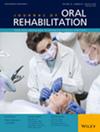Long-Term Study on the Fluctuation of Self-Reported Awake Bruxism in a Cohort of Healthy Young Adults
Abstract
Background
The introduction of a smartphone-based ecological momentary assessment (EMA) approach has allowed achieving data on the frequency of different awake bruxism (AB) behaviours (i.e., teeth contact, teeth clenching, teeth grinding, and mandible bracing) reported by an individual in the natural environment.
Study Objectives
The fluctuation of AB reports over time has a certain degree of variability that has never been investigated. Therefore, the aim of this investigation was to assess the long-term fluctuation of AB behaviours in a population of young adults.
Methods
A smartphone application was used to assess a real-time report on five specific oral conditions related to AB in a sample of 77 young adults, aged 24.0 ± 0.8 years. Data were recorded over three periods of 7 days, with a three-month interval for a total of 6 months.
Results
The average frequency of the relaxed condition was 72.9%, 78.2%, and 80.8% at the end of the first, second, and third sessions, respectively. On average, teeth contact and mandible bracing were the most frequently reported conditions, with a mean prevalence of 12.9% and 7%, respectively, whilst the frequency of teeth clenching and teeth grinding was less than 3%. The ANOVA test showed an absence of significant differences (p < 0.05) between the three recording periods, and the frequency was in general only moderately variable from day-to-day (e.g., the coefficient of variation (CV) for the condition “relaxed jaw muscles” was 0.3). No gender differences were detected either.
Conclusions
Findings suggest that in a population of healthy individuals, the frequency of AB behaviours over a six-month monitoring period is quite constant. This investigation represents a standpoint for future comparisons on the study of natural fluctuations of AB behaviours as well as on AB frequency in populations with risk/associated factors and possible clinical consequences.


 求助内容:
求助内容: 应助结果提醒方式:
应助结果提醒方式:


